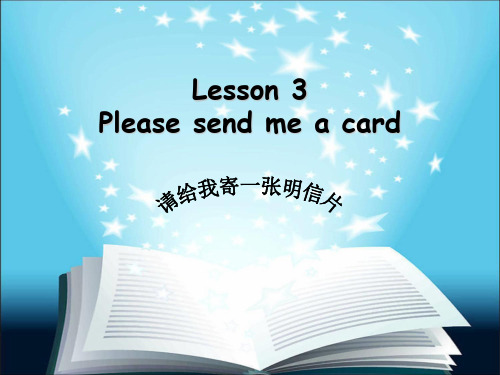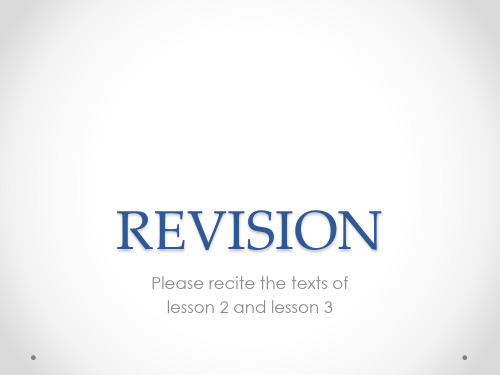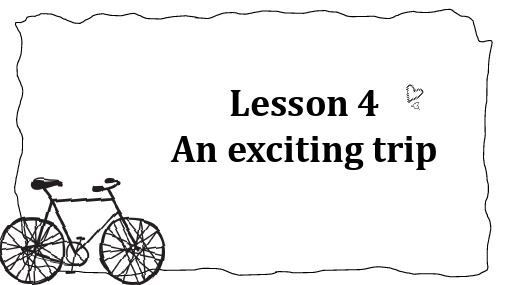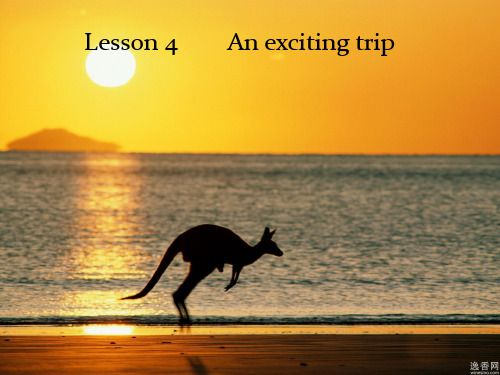新概念二Lesson4课件PPT
新概念第二册Lesson3-lesson4完整版

Explain the text
• 1)a little Italian:语言不可数,所以要用 a little Italian 或 a few words of Italian • a little / little / a few / few 的区别: • a little / a few 都用肯定句,分别表示“有一点”和“有几 个”,但 a little 修饰不可数名 • 词;a few 修饰可数名词复数 • little / few 都用否定句,分别表示“没有多少”和“没有 几个”,但 little 修饰不可数名词; • few 修饰可数名词复数
spoil /spɔɪl/
• v. 损坏,破坏 (主要指精神上) • 过去式,过去分词:spoiled or spoilt Don't let him spoil your night The bad weather spoiled my mind • v. 宠坏,溺爱 He is a spoiled child. She spoiled her son by giving him too much money.
spend /spend/
• v. 用,花销 spend somemoney/sometime on sth / in doing sth spend 300 yuan on a new TV-set spend much time on sports I spend 10 years to learn English well. We spend 3 hours on the NBA final games last night.
这条小狗被宠坏了, 每天到处小便. piss
public /'pʌblik/ • 1)公共的:public school / place / house (pub 酒吧) • 2)反义词:private • 3)短语:in private 私下里的 ----- in public 公开的 • 例如:Why not have a conversation in public? • We are good friends in priv • • • • •
新概念英语第二册+Lesson+4+An+exciting+trip+讲义

新概念英语第二册Lesson 4 An exciting tripI have just received a letter from my brother, Tim. He is in Australia. He has been there for six months. Tim is an engineer. He is working for a big firm and he has already visited a great number of different places in Australia. He has just bought an Australian car and has gone to Alice Springs, a small town in the centre of Australia. He will soon visit Darwin From there, he will fly to Perth. My brother has never been abroad before, so he is finding2 this trip very exciting.参考译文我刚刚收到弟弟蒂姆的来信,他正在澳大利亚。
他在那儿已经住了6个月了。
蒂姆是个工程师,正在为一家大公司工作,并且已经去过澳大利亚的不少地方了。
他刚买了一辆澳大利亚小汽车,现在去了澳大利亚中部的小镇艾利斯斯普林斯。
他不久还将到达尔文去,从那里,他再飞往珀斯。
我弟弟以前从未出过国,因此,他觉得这次旅行非常激动人心。
单词1.exciting adj. 令人兴奋的excited adj. (感到)兴奋的excite v. 令……兴奋(人作主语)It must be an exciting trip. 那一定是一次令人兴奋的旅行。
类似的词:surprising 令人惊奇的surprised 感到惊奇的interesting 令人感兴趣的interested 感到感兴趣的shocking 令人震惊的shocked 感到震惊的statisfying 令人满意的statisfied 感到满意的disappointing 令人失望的disappointed 感到失望的moving 令人感动的moved 感到感动的touching 令人感动的touched 感到感动的embarrassing 令人尴尬的embarrassed 感到尴尬的2.receive vt.(1)接到,收到,得到:When did you receive that letter?你什么时候收到那封信的?Susan received a gift/card this morning.今天上午苏珊收到了一份礼物/一张卡。
新概念2 Lesson4 An exciting trip

He has just bought an Australian car and has
同位语 from 既可以加时间 又可以加地点
Alice springs, a small town in the centre of go the Perth by air
He will soon visit Darwin. From there, he wi My brother has never been abroad before, so
★abroad ★firm
adv. 在国外 副词,直接和动词连用 go abroad/live abroad/study abroad/be abroad n.公司 company 更口语化 corporation 公司,法人,团体 group 集团公司 firm adj. 牢固的,坚实的,坚决的 The leg of that chair is not very firm. as firm as rock. 坚如磐石
believe/see/hear/know/understand/think/f eel/show/sound/like/care/love/desire等
现在完成时
构成: have/has+动词的过去分词
注意:动词的不规则变化,过去分词 go-went-gone drive-drove-driven sleep-slept-slept do-did-done
★different
adj. 不同的 反义词-
same (Br) A is different from B. (Br) A is different to B. Everyone is different from others. (Am) A is different from B. (Am) A is different than B. You look different than before.
新概念二Lesson 4 An exciting trip

• ★firm n. 商行, 公司 • company • big company=firm
他已经在这个公司工作三年了。 他一年前在这个公司工作。 他将从明年开始在这个公司工作。
• • • •
★different adj. 不同的 difference n. be different from The difference between A and B is
What is Tim’s job? Who is an engineer?
I have just received a letter from my brother, Tim. He is in Australia. He has been there for six months.
for He is working ____a big_____ and he has firm already visited a great number of different ______________________places in Australia.
He _________there for six months. has been
Where has he been for six months? How long has he been there for? Who has been there for six months?
engineer . Tim is an_________
• • • • • • •
He has just bought an Australian car and has gone to Alice Springs, ________ a small town in the centre of ____________Australia. What has he just buy? Where has he gone to? Where is the Alice Springs? Is Alice Srings a big town?
新概念2lesson4

• 2招待,接待: • You need a large room if you are going to receive so many guests. • 如果你要接待这么多客人,你就需要一个大房间。 • • We usually receive guests on Saturday. • 我们通常星期六招待宾客。
a number of后面一定要加可数名词复数 =many;通常number前有great,large, good, small等形容词 A great amount of +不可数名词=much The number of……的数量
Different adj.不同的—— same相同的
adv. differently, n. difference
在国外副词直接和动词连用goabroad去国外liveabroad国外定居studyabroadbefore用在句子的末尾是副词翻译为在此之前是现在完成时态的标志
REVISION
Please recite the texts of lesson 2 and lesson 3
Revision
Postcards always __s_p_o_il my holidays. Last summer, I went to __It_a_ly_. I _v_i_si_te_dmuseums and sat in __p_ub_l_ic_ gardens. A _fr_ie_n_d_lywaiter taught me a few words of _I_ta_l_ia_n_. Then he _l_en_t__ me a book. I read a __f_e_w__ lines, but I did not _u_n_d_e_rs_ta_nd a word. Every day I _th_o_u_gh_t_a_b_o_ut__ my postcards. My holidays passed __q_u_ic_k_ly__, but I did not __se_n_d__ cards to my friends. __O_n__ the last day I __m_a_d_e _ a big _de_c_is_io_n__. I got up _e_a_rl_y_ and _b_o_u_g_h_t thirty-seven cards. I __sp_e_n_t__ the __w_h_o_le__ day in my room, __b_ut__ I did not write a ___si_n_gl_e_ card!
新概念第二册ppt课件

• 以下短语中名词前不加冠词与加冠词意思有区别 • go to school 去上学; go to the school 去学校; • go to hospital去看病; go to the hospital去医院
3、I did not enjoy it. enjoy vt. 欣赏,享受,喜爱 ① enjoy +n. 喜欢,从当中得到一种享受(后面不能跟人) eg. I enjoy the music. enjoy the dinner\film\game ② enjoy oneself/代词 玩的开心 eg. We always enjoy ourselves. ③ enjoy +动名词 eg. Jane doesn’t enjoy swimming.
【课文讲解】
1、Last week I went to the theatre. • go to the +地点 表示去某地干什么事 • go to the theatre = go to the theatre to see a play去剧 场看戏 • go to the cinema =see a film 去电影院看电影
+ to sb. \ sth.
★business n. 事, 生意 • ① n. 生意 • businessman 生意人 • businesswoman • do business: 做生意 • go to some place on business:因公出差 eg. I went to Tianjin on business.
新概念英语第二册 Lesson 4 课件

5. centre n. 中心,中央 (美语写作center) shopping centre 购物中心 in the centre of ...在...的中心
e.g. 在北京的中心 in the centre of Beijing
6. abroad adv. 在国外 be abroad 在国外 go abroad 去国外 live abroad 住在国外 (国外定居) travel abroad 在国外旅游 study abroad 国外学习
The doctor has saved over two hundred people’s lives so far. 到目前为止,这位医生已挽救了二百多人的生命。
用for 或since填空。
1. Jill has been in Ireland since Monday. 2. Jill has been in Ireland for three days.
否定句:主语+have/has not+过去分词+其它 He has not been to Australia.
疑问句:Have/Has+主语+过去分词+其它 Has he been to Australia?
三、现在完成时的时间状语
1. 现在完成时与不明确的过去时间状语副词before,just, already,yet,ever等连用。
• I have just received a letter from my brother, Tim. He is in Australia. He has been there for six months. Tim is an engineer. He is working for a big firm and he has already visited a great number of different places in Australia. He has just bought an Australian car and has gone to Alice springs, a small town in the centre of Australia. He will soon visit Darwin. From there, he will fly to Perth. My brother has never been abroad before, so he is fending this trip very exciting.
新概念二-Lesson4-An-exciting-trip

Special Difficulties
receive 只表示客观的收到 She has received his present, but she will not accept it. 她收到了他的礼物,但她是不会接受的。 take 所表示的接受包含着有人赠给的意思 Did you take his advice? 你接受了他的建议了吗? He takes anything he is given. 给他什么他就要什么。 Is there nobody to take my instructions? 难到没有人接受我的指令吗?
a number of + 可数名词复数, number 前面一 般可以用 great, large, small来形容数量的大小。 a great many of + 可数名词 a great amount of + 不可数名词
4. He has just bought an Australian car and has gone to Alice Spring, a small town in the centre of Australia. He has gone to Beijing. (去了还没回来)
He has been to Beijing. (去了已经回来)
5. He will soon visit Darwin. From there, he will fly to Perth.
6. My brother has never been aboard before, so he is finding this trip every exciting.
不规则动词的过去分词见下表,是需要特殊过去分词同 形) cost cost cost cut cut cut hurt hurt hurt hit hit hit hurt hurt hurt let let let put put put read read read 2) AAB型(动词原形与过去式同形) beat beaten beat (跳动) 3) ABA型(动词原形与过去分词同形) come came come become became become run ran run
- 1、下载文档前请自行甄别文档内容的完整性,平台不提供额外的编辑、内容补充、找答案等附加服务。
- 2、"仅部分预览"的文档,不可在线预览部分如存在完整性等问题,可反馈申请退款(可完整预览的文档不适用该条件!)。
- 3、如文档侵犯您的权益,请联系客服反馈,我们会尽快为您处理(人工客服工作时间:9:00-18:30)。
默写 Lesson 3
• • • • • • • • • • 1 Postcards - spoil - holidays 2 summer - Italy 3 museums - sat - gardens 4 waiter - few - Italian 5 lent - book, but - understand 6 Every day - thought - postcards 7 holidays - quickly - not - cards - friends 8 last day - decision 9 early - thirty-seven cards 10 whole day - room - not - single card
centre [‘sentə] n. 中心
abroad [ə‘brɔːd] adv. 在国外
exciting [ɪk‘saɪtɪŋ] adj. 令人兴奋的
exciting a.令人兴奋的, 使人激动的(主语让别人感 到兴奋) excited a.(主语自己)感到兴奋的(主语是通常为 人)
e.g. We are very excited about this news. -ed主语自身感到 e.g. interested, bored, ... -ing主语令别人感到 e.g. interesting,boring, … 【Exercise: 中译英】 e.g. This news is very exciting .
课文精析
I have just received a letter from my brother, Tim.
现在完成时表完成结束 同位语
He is in Australia. He has been there for six months.
现在完成时表持续
Tim is an engineer.
一般将来时
My brother has never been abroad before, so he is finding this trip very exciting.
S+ V + O +C
Retell the text according to the following words.
He is working for a big firm and he has already visited a
great number of different places in Australia.
现在进行时 现在完成时表完成
a (great) number of = many 许多
动作
一般过去时
时间
动作发生在过 表过去的一个 去,做一个陈 时间点或特定 述,描对现在造 不确定时间 成了影响。
我住在这儿二十年了。 I have lived here for twenty years. 我参观过这个城市。 I have visited this city. 我已经把书还了。 I have already returned the book. 我认识他三年了。 I have known his for three years. 我吃过晚饭了。 I have already had supper.
Lead—in
Do you like travelling?
Have you been to Australia?
What do you know about Australia?
kangaroo koala
Sydney Opera House
Snapshot of Key words
exciting [ɪk‘saɪtɪŋ] adj. 令人兴奋的 receive [rɪ‘siːv] v. 接受;收到 firm[fɜːm] n. 商行;公司 different [‘dɪf(ə)r(ə)nt] adj.不同的
firm[fɜːm] n. 商行;公司
1. n. 公司,商号
law firm 法律公司 e.g. 他在一家工程公司工作。 He works for an engineer firm.
2. adj. 结实的,稳固的 e.g. 这部小汽车非常坚固。 The car is very firm.
【了解】有关“公司”的表达:firm 中小型公 司;company正规公司;business商行;
centre [‘sentə] n. 中心 (美式center)
the center of town 市中心 town centre= downtown 市中心,市区 经典用法: in the center of: 在中间, 在中央 = in the middle of in the centre (of sp),
Grammar:现在完成时
past 一般过去时 现在完成时 now
future
一般过去时表示的是纯粹在过去发生的事情 (描述,陈述) 现在完成时表示的是在过去某个时间开始并 持续到现在的动作/状态(持续),或者发生在过 去却对现在造成的影响(结束)
1. 表示一个动作发生在过去但对现在仍然有影响。 常与表不确定时间的状语或表一段时间的时间状语连用。 2. 时间状语: just, already, lately, ever, (not) yet, so far, up till now(到目前为止), for six months, since 1955, in past years. 3. 汉语意思表:已经 4. 表一段时间的时间状语, 不能和点动词(非延续性)连用. I have lived/been here for four years. He has just retired. He has already retired. Has he retired yet? He hasn’t retired yet. I have bought this book for ten months. (×) I have got this book for ten months.
延续性动词和瞬间性动词之间的转化
1. He died 10 years ago. --- He ____ ____ ____ for 10 years / since 10 years ago. die 是终止性动词,表示动作,常用作谓语,含义为“断气”。 dead是形容词,与be动词连用,常用来作定语、表语或补语,表示死 的状态。 2. He borrowed the book 2 weeks ago. --- He ____ ____ the book for 2 weeks. keep 3. He bought the motorbike a month ago. ---He ____ ____ the motorbike for a month. have get 4. He arrived here three days ago. --- He ____ ____ here since three days ago. been in
完成时态所关心的是现存的结果,或者过去发生的事对现在的影 响。可以表示最近完成的动作,也可以表示经历或经验。 They have left. (现在他们人不在这里) I have had my lunch. (我现在不饿) My wife has just bought a beautiful dress from one of the shops here. 现在完成时态表示过去已经开始、持续到现在(可能还会继续进 行下去)的动作或状态,常和表示一段时间的状语连用。 She has lived in Beijing since she came to China. How many words have you learned this year? He has learned English since 2001. --从2001年开始学的,现在还在继续学着呢
Questions:
Q1. Has the writer just received a letter from his brother? Yes, he has. Q2. Where is the writer’s brother? He is in Australia. Q3. How long has Tim been there? He has been there for six months. Q4. What's Tim’s job? He's an engineer.
5. They turned off the light 2 hours ago. --- The light ____ ____ ____ for 2 hours. is off 6. He left here 2 years ago. --- He ____ ____ ____ from here for 2 years. is away 7. The film began 30 minutes ago. --- The film ____ ____ ____ for 30 minutes. is on 8. They opened the door an hour ago. --- The door ____ ____ ____ for an hour. is open 9. They closed the door an hour ago. --- The door ____ ____ ____ for an hour. is closed
区别用法:receive 和 accept 1. receive(客观情况)只表示被动地接受 2. accept(主观情况)总表示主动而且高兴地接受 e.g.她收到了他的礼物,但是没有接受 She received his present, but she didn’t accept it. 【Exercise 选词填空】 A I _________ the invitation. A. accepted B. received
